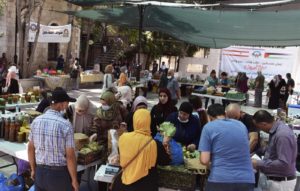“At the farmers’ market, I sell my produce and wrap it with love,” says Saad Dagher, a Palestinian farmer at a farmers’ market in the West Bank, where activists have tried to create a profitable space for farmers to sell their products while also creating social bonds with their communities.
“I am happy as a farmer because I give the Palestinian consumers the best I can produce. It is cultivated with love and sold with love,” Dagher, who sells his produce in Ramallah’s market, told Middle East Eye.
Palestinian grassroots groups aim at supporting local farmers to both cultivate and protect their land through the Souk el-fallaheen, weekly farmers’ markets that have started in many Palestinian cities, amid Israel’s plans to annex parts of the occupied West Bank.
For Palestinian farmers, the ordinary way of marketing their products is by selling them to intermediaries, who then sell them on to supermarkets and shops. Usually, the middleman gets the highest percentage of profit, while the farmer, who actually produces the goods, gets very little and in many cases loses money.
“In the traditional market, a farmer sells to a trader, who seeks the lowest price from the farmer and the highest price from the consumer,” says Saad Dagher.
Aisha Mansour, a volunteer with the Sharaka initiative that co-organises the farmers’ market in al-Bireh, a city in central West Bank, emphasises how the traditional market has turned farming into a financially useless career.
“In today’s free-trade market, local farmers find it difficult to compete and earn a fair price for their produce. The market in the West Bank is flooded with cheap products from Israel to the detriment of local production.”
The farmers’ inability to market their produce has left some unwilling to plant in the first place. Consequently, some abandon farming and, by extension, neglect their lands, which could make it difficult for Palestinians to protect their lands from Israeli encroachment.
Israeli authorities have used different land laws to grab Palestinian agricultural lands, most notably one dating from 1858 that allows them to confiscate the uncultivated Palestinian plots and hand them over to the Jewish settlers or use them for “military” purposes.
By contrast, the farmers’ markets “give small-scale farmers a platform to promote their products directly to the consumers at a much better and fair price, in an environment that allows social interaction with producers,” says Rami Massad, a volunteer with the Youth Partnership Forum, which organises the market in Nablus, a city in northern West Bank.
“The market contributes to strengthening the farmers’ resilience and expanding their work through a permanent marketing channel that makes farming financially feasible and encourages them to stay on the land and cultivate it, protecting it from confiscation.
“Supporting farmers to stay on their farms and cultivate more plots of land is the main instrument to fight the building of new illegal [Israeli] settlements on Palestinian land.”

